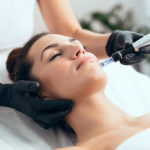
Photo By Moyo Studio at istock
While it’s true that washing your hands frequently with soap effectively removes germs and dirt from your skin, it can also remove your skin’s natural oils. Harsh soaps used too often can result in a dry, rough feeling on your hands. Depending on your cleanser of choice, some brands are more drying than others, and some may be quite abrasive. If you’ve got a tendency for dry skin anyway, and often see your dermatologist for this very reason, you may notice a sharp increase in the dryness and flakiness of your skin, as you are encouraged to wash your hands more with soaps.
If you suffer from patches of dry, flaking skin on your hands or face, you’ll notice it’s more frequent when the outside air is drier. Even indoors, if you don’t have a humidifier in your home, you may notice it happening more frequently. With current health regimes suggesting frequent handwashing is the way forward, looking after your hands by adopting an excellent hand care routine is something every dermatologist will be recommending this season.
Everyone from the World Health Organization to your local doctor is pushing for an increase in handwashing habits to help prevent the spread of coronavirus. It’s no secret that there’s a link between handwashing and dry hands – any dermatologist you speak to will be able to attest to this, and also work with you to develop a skincare routine that suits your skin type.
Both liquid soaps and bars of soap can, unfortunately, have a drying effect on your skin, depending on their active ingredients. Pure soap is a mixture of salts and fatty acids. This caustic mix is capable of removing your skin’s protective acid layer, which can adversely affect the condition of your skin.
If you’ve got a pre-existing skin condition such as eczema, you may find that ‘normal’ soap is quite hard on your skin. Your Southlake, TX, dermatologist will be able to recommend softer varieties that are kinder to your skin – after all, looking after your skin is our profession! Handwashing choices can be very confusing when you don’t have access to a doctor to analyze your skin condition and recommend a suitable care regimen.
In a nutshell, both liquid and bar soaps do the same thing for normal skin. But if you’ve got sensitive skin that’s prone to dryness or reaction, your dermatologist may likely recommend avoidance of liquid soaps. Liquid soaps can have added preservatives, fragrances, and other ingredients that may act as allergens, making it harder for you to achieve soft, hydrated skin if your skin is in any way sensitive.
If you’re lucky enough to have hand sanitizers available, using these can be less drying than a soap and water routine if you find that soap and water are unavailable. Hand sanitizer can help to kill viruses on your skin, especially if it has a high alcohol percentage, making it the go-to choice in areas where reducing infection rates is critical, such as hospitals and other potentially crowded spots. However, if you do have sensitive skin to start with or you have a broken skin barrier, hand sanitizer is more of an irritant.
Whether you have dry, sensitive skin or not, including a moisturizer in your skincare routine will help to keep your skin in good condition. Dermatologists everywhere know that what you’re doing when you’re moisturizing is helping to restore the skin barrier, replacing your skin’s natural oils that might have been wiped away or destroyed by an excessive hand washing routine.
Looking after your hands can be as simple as introducing the right moisturizer. Three main types are available to choose from: lotions, creams, and ointments. Lotions are often sold in pump packs, often feel lighter and more absorbent than other types of moisturizer, and can avoid the greasy, sticky feeling. You’ll typically find creams sold in jars and tubes, and they can often feel heavier and oilier than lotions, but they do last longer on your skin. Another side effect of using cream is that your skin may feel slippery or sticky afterward – a complete opposite to the dry, flaky feeling you may experience with soaps.
Ointments are oil-based, tubed concoctions that are known for being the heaviest, greasiest option. If you have been recommended or prescribed an ointment to treat a skin condition or help your skin to feel less dry, it’s often best used before bed as you’ll not be using your hands for a while.
Every dermatologist will have their favorites. Everyday skincare routines that may be advised by your doctor include using a light moisturizing lotion throughout the day to avoid drying out or irritating your hands unnecessarily. In contrast, nightly hand care routines will usually include creams or ointments that will help your skin to repair overnight.
There are a few key ideas to keep in mind when choosing the right hand treatments to help avoid dry, irritated skin:
- Don’t buy a fragranced moisturizer with essential oils if you can avoid it. The more ingredients a moisturizer has, the more likely it may include an allergen that can upset your skin further.
- Try to avoid runny oils as these aren’t known for hydration.
- Don’t share any moisturizers you do have with others, and only use your moisturizer after you have already washed your hands with your preferred soap or sanitizer.
- If you notice your hands are becoming itchy or irritated, stop using the product, and try to speak to a dermatologist, doctor, or healthcare professional by phone, before turning up at your local office for an appointment.
While ongoing pandemics such as COVID-19 are in effect, Compassion Dermatology in Southlake, TX, offers revised patient guidelines. Product purchases are still available and can be processed by phone while you wait in your car. Payments can still be made online or over the phone. If you’re looking for a suitable hand care product, contact your dermatologist at Compassion to see what we’ve got in stock and what we can recommend to help you minimize the adverse effects of a repeated, aggressive hand washing routine.


